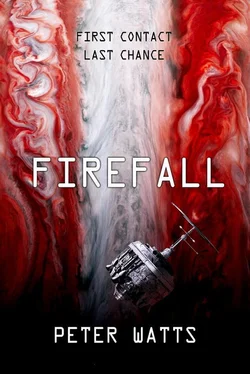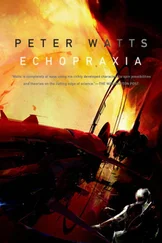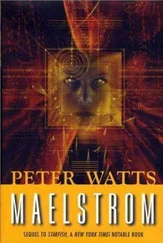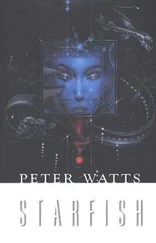A hole, a burrow. A place to hide. I dove through, my torn hand flapping like a dead fish against the edge of the hatch. I cried out and tumbled into the drum, the monster at my heels.
Startled shouts, very close now. “This wasn’t the plan, Jukka! This wasn’t the goddamned plan! ” That was Susan James, full of outrage, while Amanda Bates snarled “ Stand down, right fucking now! ” and leapt from the deck to do battle. She rose through the air, all overclocked reflexes and carboplatinum augments but Sarasti just batted her aside and kept on coming. His arm shot out like a striking snake. His hand clamped around my throat.
“Is this what you meant?” James cried from some dark irrelevant hiding place. “Is this your preconditioning ?”
Sarasti shook me. “Are you in there, Keeton?”
My blood splattered across his face like rain. I babbled and cried.
“Are you listening? Can you see ?”
And suddenly I could. Suddenly everything clicked into focus. Sarasti wasn’t talking at all. Sarasti didn’t even exist anymore. Nobody did. I was alone in a great spinning wheel surrounded by things that were made out of meat, things that moved all by themselves . Some of them were wrapped in pieces of cloth. Strange nonsensical sounds came from holes at their top ends, and there were other things up there, bumps and ridges and something like marbles or black buttons, wet and shiny and embedded in the slabs of meat. They glistened and jiggled and moved as if trying to escape.
I didn’t understand the sounds the meat was making, but I heard a voice from somewhere. It was like God talking, and that I couldn’t help but understand.
“Get out of your room , Keeton,” it hissed. “Stop transposing or interpolating or rotating or whatever it is you do. Just listen . For once in your goddamned life, understand something. Understand that your life depends on it. Are you listening , Keeton?”
And I cannot tell you what it said. I can only tell you what I heard.
* * *
You invest so much in it, don’t you? It’s what elevates you above the beasts of the field, it’s what makes you special . Homo sapiens , you call yourself. Wise Man. Do you even know what it is , this consciousness you cite in your own exaltation? Do you even know what it’s for ?
Maybe you think it gives you free will. Maybe you’ve forgotten that sleepwalkers converse, drive vehicles, commit crimes and clean up afterwards, unconscious the whole time. Maybe nobody’s told you that even waking souls are only slaves in denial.
Make a conscious choice. Decide to move your index finger. Too late! The electricity’s already halfway down your arm. Your body began to act a full half-second before your conscious self ‘chose’ to, for the self chose nothing; something else set your body in motion, sent an executive summary—almost an afterthought—to the homunculus behind your eyes. That little man, that arrogant subroutine that thinks of itself as the person, mistakes correlation for causality: it reads the summary and it sees the hand move, and it thinks that one drove the other.
But it’s not in charge. You’re not in charge. If free will even exists, it doesn’t share living space with the likes of you.
Insight, then. Wisdom. The quest for knowledge, the derivation of theorems, science and technology and all those exclusively human pursuits that must surely rest on a conscious foundation. Maybe that ’s what sentience would be for—if scientific breakthroughs didn’t spring fully-formed from the sub conscious mind, manifest themselves in dreams, as full-blown insights after a deep night’s sleep. It’s the most basic rule of the stymied researcher: stop thinking about the problem . Do something else. It will come to you if you just stop being conscious of it.
Every concert pianist knows that the surest way to ruin a performance is to be aware of what the fingers are doing. Every dancer and acrobat knows enough to let the mind go , let the body run itself. Every driver of any manual vehicle arrives at destinations with no recollection of the stops and turns and roads traveled in getting there. You are all sleepwalkers, whether climbing creative peaks or slogging through some mundane routine for the thousandth time. You are all sleepwalkers.
Don’t even try to talk about the learning curve. Don’t bother citing the months of deliberate practice that precede the unconscious performance, or the years of study and experiment leading up to the gift-wrapped Eureka moment. So what if your lessons are all learned consciously? Do you think that proves there’s no other way? Heuristic software’s been learning from experience for over a hundred years. Machines master chess, cars learn to drive themselves, statistical programs face problems and design the experiments to solve them and you think that the only path to learning leads through sentience ? You’re Stone-age nomads, eking out some marginal existence on the veldt—denying even the possibility of agriculture, because hunting and gathering was good enough for your parents.
Do you want to know what consciousness is for? Do you want to know the only real purpose it serves? Training wheels. You can’t see both aspects of the Necker Cube at once, so it lets you focus on one and dismiss the other. That’s a pretty half-assed way to parse reality. You’re always better off looking at more than one side of anything . Go on, try. Defocus. It’s the next logical step.
Oh, but you can’t. There’s something in the way.
And it’s fighting back.
* * *
Evolution has no foresight. Complex machinery develops its own agendas. Brains—cheat. Feedback loops evolve to promote stable heartbeats and then stumble upon the temptation of rhythm and music. The rush evoked by fractal imagery, the algorithms used for habitat selection, metastasize into art. Thrills that once had to be earned in increments of fitness can now be had from pointless introspection. Aesthetics rise unbidden from a trillion dopamine receptors, and the system moves beyond modeling the organism. It begins to model the very process of modeling. It consumes ever-more computational resources, bogs itself down with endless recursion and irrelevant simulations. Like the parasitic DNA that accretes in every natural genome, it persists and proliferates and produces nothing but itself. Metaprocesses bloom like cancer, and awaken, and call themselves I .
* * *
The system weakens, slows. It takes so much longer now to perceive —to assess the input, mull it over, decide in the manner of cognitive beings. But when the flash flood crosses your path, when the lion leaps at you from the grasses, advanced self-awareness is an unaffordable indulgence. The brain stem does its best. It sees the danger, hijacks the body, reacts a hundred times faster than that fat old man sitting in the CEO’s office upstairs; but every generation it gets harder to work around this—this creaking neurological bureaucracy.
I wastes energy and processing power, self-obsesses to the point of psychosis. Scramblers have no need of it, scramblers are more parsimonious. With simpler biochemistries, with smaller brains—deprived of tools, of their ship, even of parts of their own metabolism—they think rings around you. They hide their language in plain sight, even when you know what they’re saying. They turn your own cognition against itself. They travel between the stars . This is what intelligence can do, unhampered by self-awareness.
Читать дальше








